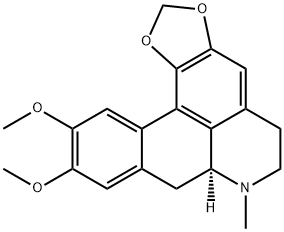D-Dicentrine – a naturally occurring aporphine type isoquinoline alkaloid
Dec 23,2019
D-Dicentrine is an aporphinic alkaloid found in several plant species, mainly from family Lauraceae, including Lindera megaphylla. D-Dicentrine shows antinociceptive activity in a mouse model of pain. It probably acts via a TRPA1-dependent mechanism [1]. D-Dicentrine is an alpha 1-adrenoceptor antagonist effective against human hyperplastic prostates.

D-Dicentrine, a naturally occurring aporphine type isoquinoline alkaloid, isolated from the root of Lindera megaphylla Hemsl. (Lauraceae), was evaluated for its potential anti-cancer activity. Huang RL etc. found d-dicentrine significantly inhibited the growth of human hepatoma cell line HuH-7 by delaying its doubling time in tissue culture. An in vitro colony forming assay showed that d-dicentrine decreased the colony formation efficiency in both hepatoma cell lines, HuH-7 and MS-G2, used in our study. Biosyntheses of the macromolecules DNA and RNA were also strongly inhibited. An MTT assay in 21 tumor cell lines also revealed that d-dicentrine was most cytotoxic to esophageal carcinoma HCE-6, lymphoma cell lines Molt-4 and CESS, leukemia cell lines HL60 and K562, and hepatoma cell line MS-G2. An in vitro tumor growing assay in the Severe Combined immunodeficiency (SCID) mice showed that intraperitoneal injection of d-dicentrine at the dose of 100 micrograms twice a week for 4 weeks significantly inhibited the tumor incidence of leukemia cell line K562 in SCID mice. All these data indicated that d-dicentrine has potential anti-tumor applications [2].
References
[1] https://en.wikipedia.org/wiki/Dicentrine
[2] Huang RL, Chen CC, Huang YL, Ou JC, Hu CP, Chen CF, Chang C, Anti-tumor effects of d-dicentrine from the root of Lindera megaphylla, Planta Med. 1998 Apr;64(3):212-5
- Related articles
- Related Qustion
Dansyl chloride or 5-Dimethylaminonaphthalene-1-sulfonyl chloride (CAS 605-65-2) is a fluorogenic reagent used for protein, N-terminal amino acid and peptide detection by reverse phase high performance liquid chromatography (HPLC).....
Dec 23,2019Chemical ReagentsAnkaflavin (AK), isolated from Monascus-Fermented red rice, is a PPARγ agonist with anti-inlfammatory activity. Ankaflavin is an active compound having anti-inflammatory, anti-cancer, antiatherosclerotic, and hypolipidemic effects.....
Dec 23,2019Natural ProductsDicentrin
517-66-8You may like






